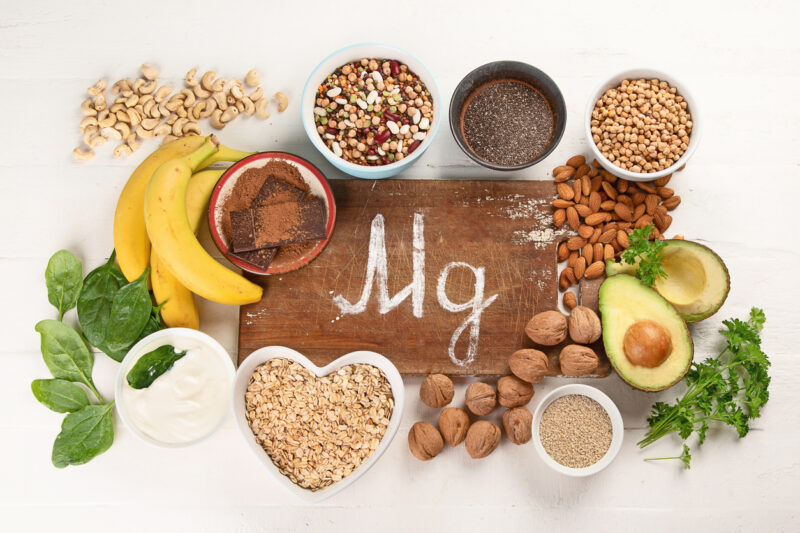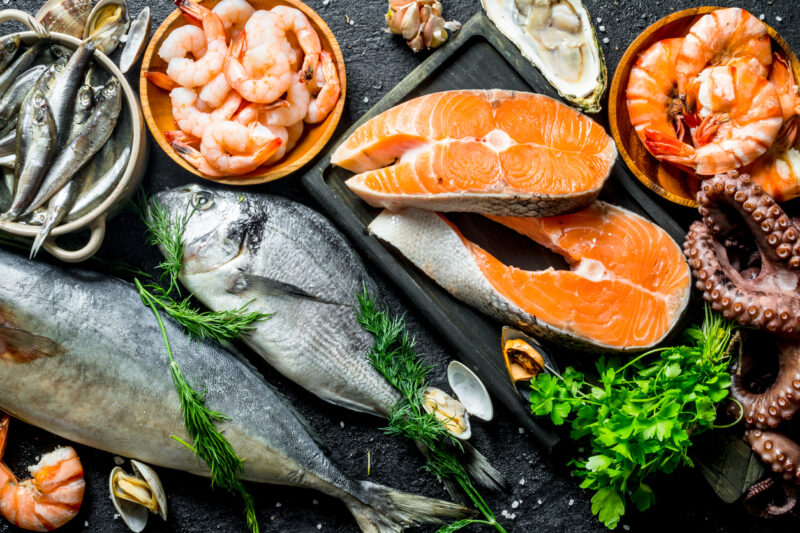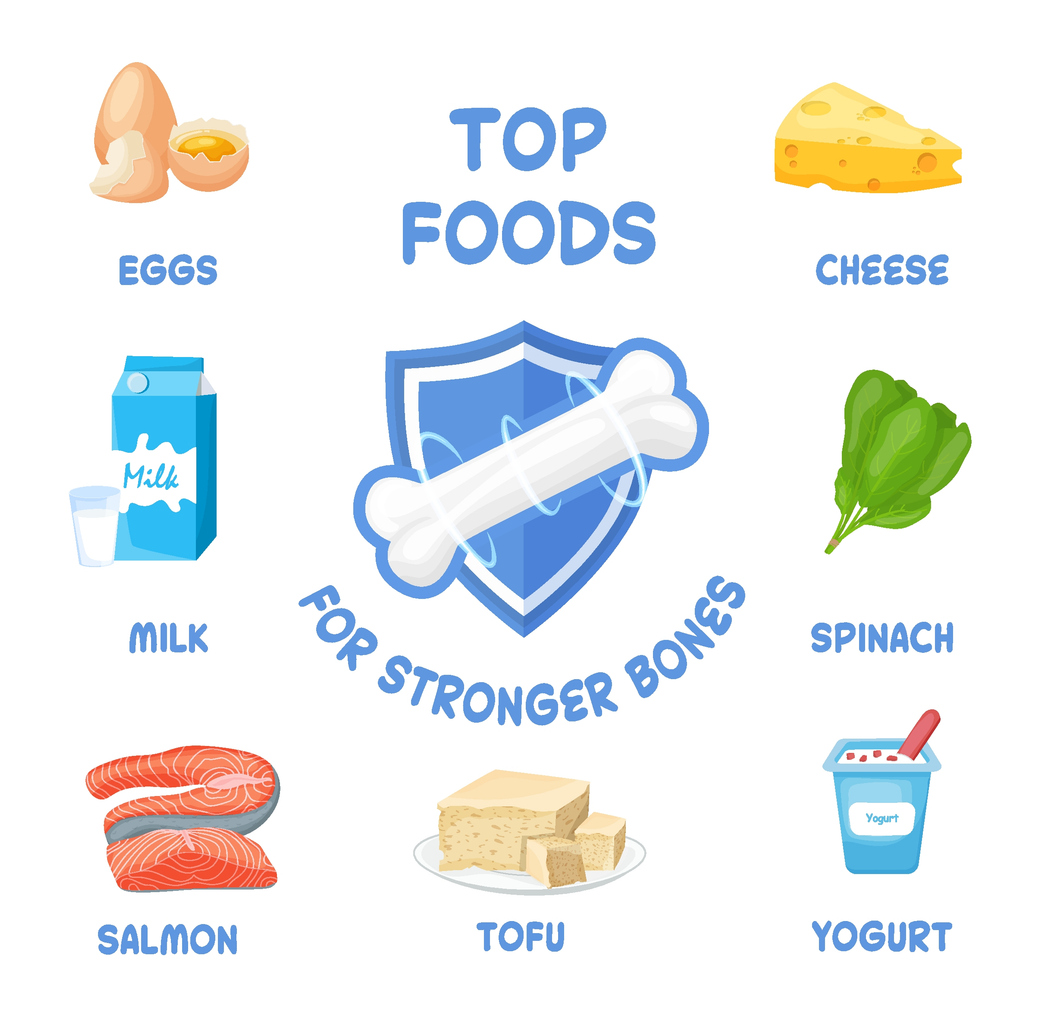Why Bone Strength Matters: Understanding the Importance of Bone Health
Bone health is a crucial aspect of overall wellness, yet it’s often overlooked until problems arise. As we age, maintaining strong bones becomes essential to avoid fractures, mobility issues, and conditions like osteoporosis. Our bones provide structure, protect organs, and anchor muscles, so keeping them strong is key to a healthy, active life.
The Impact of Diet on Bone Health
A balanced diet is a powerful tool for supporting bone strength. By focusing on the right foods, you can naturally boost bone density and resilience. While many associate bone health with calcium, a variety of foods contribute to maintaining strong bones. Choosing nutrient-dense options in your daily meals is a proactive way to protect your bones and enhance your overall quality of life.
Calcium-Rich Foods for Bone Strength: Dairy and Beyond
Calcium is often the first nutrient that comes to mind when thinking about bone health. This essential mineral plays a critical role in building and maintaining strong bones. While dairy products like milk, cheese, and yogurt are well-known sources of calcium, there are many other foods that can contribute to bone strength, especially for those who are lactose intolerant or prefer plant-based diets.

Exploring Non-Dairy Sources of Calcium
For those looking beyond dairy, a variety of foods can help meet your calcium needs. Leafy green vegetables such as kale, bok choy, and broccoli are excellent options. Additionally, fortified plant-based milks, tofu, and almonds provide substantial calcium. Incorporating these foods into your diet ensures you are getting the necessary calcium to support bone health.
The Importance of Variety in Your Diet
Relying solely on dairy or a single food source for calcium isn’t enough. A balanced diet that includes a wide range of calcium-rich foods is essential. By diversifying your intake, you not only support your bones but also enhance overall nutrition. Whether through dairy or plant-based alternatives, ensuring adequate calcium intake is key to maintaining strong bones.
Vitamin D and Bone Health: The Best Foods to Boost Your Vitamin D Levels
Vitamin D plays a crucial role in bone health by helping the body absorb calcium, which is essential for strong bones. Without sufficient Vitamin D, even the best efforts to consume calcium-rich foods might fall short in supporting bone strength. Therefore, including Vitamin D in your diet is vital when considering foods to increase bone strength.

Top Food Sources of Vitamin D
Vitamin D is unique because it can be synthesized by the body when exposed to sunlight. However, depending on your location and lifestyle, getting enough sun exposure may not always be feasible. In such cases, food sources become essential. Fatty fish like salmon, mackerel, and tuna are excellent sources of Vitamin D. Additionally, egg yolks and fortified foods like cereals, orange juice, and plant-based milks can help meet your Vitamin D needs.
Combining Sunlight and Diet for Optimal Bone Health
While diet plays a significant role, combining it with adequate sunlight exposure can maximize your Vitamin D levels. For those living in areas with limited sunlight, incorporating Vitamin D-rich foods into your daily meals becomes even more critical. By focusing on these foods, you can support bone health and ensure that your calcium intake is effectively utilized.
The Role of Magnesium in Bone Strength: Top Magnesium-Rich Foods
Magnesium is an essential mineral that plays a significant role in maintaining bone strength. It works alongside calcium and Vitamin D to support bone density and overall skeletal health. Without adequate magnesium, bones can become brittle, increasing the risk of fractures and osteoporosis. Therefore, when considering foods to increase bone strength, magnesium-rich options should not be overlooked.

Best Magnesium-Rich Foods for Bone Health
Incorporating magnesium into your diet is simple with a variety of food options. Leafy greens like spinach and Swiss chard are excellent sources of magnesium. Additionally, nuts and seeds, particularly almonds, cashews, and pumpkin seeds, provide a significant magnesium boost. Whole grains such as brown rice and quinoa, as well as legumes like black beans and chickpeas, also contribute to your daily magnesium intake.
The Importance of Magnesium Balance
Maintaining a balance between calcium and magnesium is crucial for bone health. Too much calcium without sufficient magnesium can lead to calcium deposits in the body, which may negatively affect bone strength. By including a variety of magnesium-rich foods in your diet, you can ensure that your bones remain strong and healthy, complementing the effects of calcium and Vitamin D.
Leafy Greens and Bone Health: How Vegetables Contribute to Stronger Bones
Leafy greens are often celebrated for their overall health benefits, but they also play a crucial role in bone health. These vegetables are packed with essential nutrients that support bone strength, making them an important part of any diet focused on foods to increase bone strength. Leafy greens not only provide calcium but also other vital nutrients like Vitamin K, magnesium, and antioxidants that work together to promote healthy bones.
Key Leafy Greens for Bone Strength
Among the top leafy greens for bone health are kale, spinach, and collard greens. These vegetables are rich in calcium, which is crucial for maintaining bone density. Additionally, they contain Vitamin K, a nutrient that plays a significant role in bone metabolism and helps regulate calcium. Incorporating these leafy greens into your daily meals can significantly contribute to stronger bones and overall skeletal health.
The Synergy of Nutrients in Leafy Greens
What makes leafy greens particularly effective for bone health is the combination of nutrients they offer. Alongside calcium and Vitamin K, leafy greens provide magnesium, which supports calcium absorption and bone structure. By including a variety of leafy greens in your diet, you create a balanced approach to bone health, ensuring that your body has the necessary tools to build and maintain strong bones.
Nuts and Seeds for Strong Bones: The Power of Omega-3 and Healthy Fats
Nuts and seeds are not only great for overall health but also play a vital role in strengthening bones. Rich in essential nutrients like magnesium, phosphorus, and omega-3 fatty acids, they contribute to bone density and help prevent bone-related conditions. Including nuts and seeds in your diet is a smart way to increase bone strength naturally, making them a valuable addition to foods that support bone health.
The Role of Omega-3 Fatty Acids in Bone Health
Omega-3 fatty acids, found in abundance in nuts like walnuts and seeds like flaxseeds and chia seeds, are known for their anti-inflammatory properties. These healthy fats help reduce bone breakdown, which is crucial in maintaining bone density as we age. By incorporating omega-3-rich nuts and seeds into your daily meals, you can support bone strength and reduce the risk of osteoporosis and fractures.
Healthy Fats and Bone Strength
In addition to omega-3s, nuts and seeds provide healthy fats that are essential for bone health. These fats aid in the absorption of fat-soluble vitamins like Vitamin D, which is crucial for calcium absorption and bone strength. Almonds, sunflower seeds, and pumpkin seeds are excellent sources of these healthy fats, making them important foods to include in a bone-strengthening diet.
Bone-Building Proteins: Foods That Promote Healthy Bones
Protein is a vital nutrient for bone health, playing a crucial role in the growth, maintenance, and repair of bones. Adequate protein intake supports bone density and helps prevent conditions like osteoporosis. When considering foods to increase bone strength, incorporating high-quality proteins into your diet is essential for promoting healthy bones and overall skeletal function.

Top Protein Sources for Strong Bones
Lean meats, poultry, and fish are excellent sources of protein that contribute to bone health. Fish like salmon and tuna are particularly beneficial, as they also provide omega-3 fatty acids, which support bone density. Plant-based proteins, such as beans, lentils, and tofu, are also effective in promoting bone strength, making them great options for those on vegetarian or vegan diets.
How Protein Supports Bone Structure
Proteins are the building blocks of the body, and this includes bones. They provide the necessary amino acids that help in the formation of collagen, which gives bones their structure and flexibility. By ensuring you get enough protein through a balanced diet, you can support your bones’ structural integrity and overall health.
The Benefits of Phosphorus for Bone Strength and Where to Find It
Phosphorus is a key mineral that works alongside calcium to build and maintain strong bones. It is the second most abundant mineral in the body, with about 85% of it stored in bones and teeth. Phosphorus helps form the mineral structure of bones, making them resilient and strong. Including phosphorus-rich foods in your diet is essential when considering foods to increase bone strength.
Top Phosphorus-Rich Foods for Bone Health
Phosphorus is found in a variety of foods, making it easy to incorporate into your diet. Dairy products like milk, cheese, and yogurt are excellent sources of phosphorus. Additionally, fish such as salmon and tuna, as well as lean meats like chicken and turkey, provide significant amounts of this important mineral. For those on plant-based diets, legumes, nuts, seeds, and whole grains are good options to ensure adequate phosphorus intake.
Balancing Phosphorus with Calcium for Optimal Bone Health
While phosphorus is crucial for bone strength, it’s important to maintain a balance with calcium. Too much phosphorus without enough calcium can lead to weakened bones. A balanced diet that includes both minerals is key to promoting long-term bone health and preventing conditions like osteoporosis.
Combining Diet and Exercise: Maximizing Bone Health Through Lifestyle Choices
Maintaining strong bones requires more than just focusing on your diet; regular exercise is also crucial. Combining foods to increase bone strength with weight-bearing exercises can significantly enhance bone density and overall bone health. A balanced approach that integrates both nutrition and physical activity is the most effective way to prevent bone-related issues as you age.
Weight-Bearing Exercises for Bone Strength
Weight-bearing exercises, such as walking, jogging, and resistance training, help stimulate bone formation and improve bone density. These activities place stress on your bones, prompting your body to reinforce bone strength. Incorporating exercises like weight lifting or body-weight exercises can greatly benefit bone health, especially when paired with a nutrient-rich diet.

Creating a Holistic Bone Health Routine
By integrating a diet rich in calcium, Vitamin D, magnesium, and other essential nutrients with regular physical activity, you can create a comprehensive bone health routine. This combination not only strengthens bones but also supports overall well-being. Remember, consistency is key; making these lifestyle choices a regular part of your routine will help maintain strong bones throughout your life.
Summary
To maintain strong bones, a combination of a nutrient-rich diet and regular exercise is essential. Key nutrients such as calcium, Vitamin D, magnesium, and phosphorus play vital roles in bone health. Foods to increase bone strength include dairy products, leafy greens, nuts, seeds, and fatty fish. Incorporating weight-bearing exercises, such as walking and resistance training, further enhances bone density. A balanced approach that combines proper nutrition with physical activity is the most effective way to prevent bone-related conditions like osteoporosis and ensure long-term bone health.
The natural bone strength complex made from Satsuma mandarin orange
Juveriente®’s Bone Strength Complex is a natural supplement made from a traditional dietary habit of a healthy bone town in Japan. People there eat a lot of Satsuma mandarin orange and have high concentration of Beta-Cryptoxanthin, a kind of carotenoid. A cohort study there found that that concentration has high reverse correlation with onset ratio of osteoporosis.
It provides you the essence of a natural food, which is simply an extract of a Japanese popular citrus fruit. It is according to your principal policy. Needless to say, it is better to try a natural food before jumping to strong medicines. Though natural and gentle, it has garnered a lot of amazing reviews in Amazon since its launching in 2016.
If you like to try multi-vitamin supplement, how about adding the natural bone therapy fruit extract with Juveriente® Bone Strength Complex?
Please learn details in our product page.





